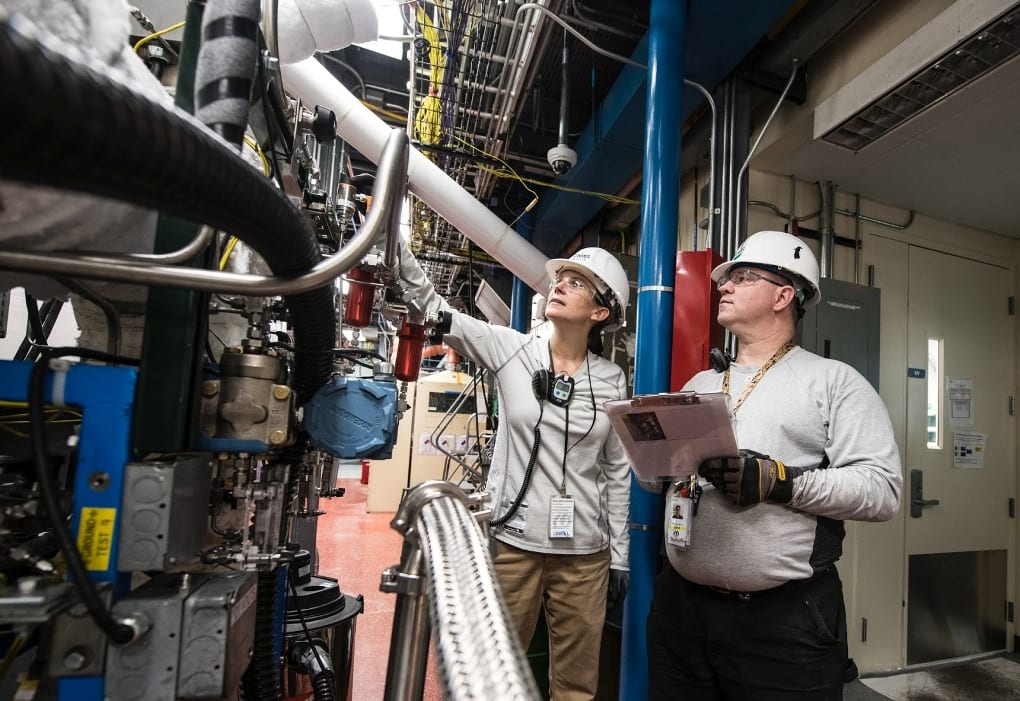Engineering skills are all about developing and designing problem-solving devices to benefit humanity. Each individual field of engineering helps solve societal issues through mechanical, electrical, or chemical innovations.
If you are interested in learning what hard skills and soft skills engineers must have, the different engineering careers available, and what employers are looking for during job interviews, then let us take you through the essentials of engineering.
Engineering Skills and Careers
Engineers use science, physics, and mathematics to find solutions that make our day-to-day lives more comfortable. Think of the steam train as an example.
Before the steam train, people either walked long distances, rode on horseback, or traveled by horse-drawn carriage. But thanks to a mechanical engineer, humans were able to move long distances at a much faster pace.
To understand an engineer’s skills, we first need to look at each type of engineering job. Below, we have compiled the tasks of engineers in each specialization, as well as the soft and technical skills required by hiring managers in each sector.
Military Engineering
In many ways, military engineering was the first form of engineering, starting with catapults and other similar inventions that can be traced back to the 11th century. As an army engineer today, you will learn skills like bridging, demolition, basic field engineering, and mine warfare.
Military engineering is still a vital engineering field that aims to keep soldiers safe and create tools that will strengthen an army. Within this field, there are many different career paths. Your specific military engineer job will depend on whether you have studied civil engineering, mechanical engineering, electrical engineering, or chemical engineering.
Military Engineering Skills
- Communication skills
- Interpersonal skills
- Platoon leadership
- Military weaponry
- Teamwork skills
- Problem-solving
- Decision-making
- Military equipment maintenance
- Engineering component design
- Quality control
- Emotional resilience
- Ability to work under pressure
- Physical strength and stamina
- Military operations knowledge
- Passion for protecting and aiding troops
Civil Engineering
Civil engineering is also an ancient practice. Civil engineering deals with what civilization is built on. It primarily involves designing and creating structures.
Not only does a civil engineer construct buildings, but they also design water supply structures, street layouts, tunnels, bridges, and sewer systems.
Just like bees would be nothing without their hive, humanity would not function without civil engineers. They form the foundations of our society by using their skills to solve problems.
Civil Engineering Skills
- Problem-solving
- Attention to detail
- Technical understanding
- Math and physics prowess
- Map reading
- Computer-Aided Design Software (CAD)
- Management skills
- Decision-making skills
- Creativity
- Visualization skills
- Understanding of environmental impacts and risk awareness
- Technical report writing
- Project management skills
- Analytical mindset
- Passion for improving communities
Mechanical Engineering
Mechanical engineering is usually what comes to mind when people hear the word engineering. Mechanical engineers have revolutionized how humanity uses machines. Consider the aforementioned steam engines, as well as robotics, airplanes, limbs, and even organs.
Although we don’t quite live in a world like The Terminator or I Robot just yet, there is no denying the progress that has been made in mechanical systems from the 18th century until now. Among other things, they are the basis for the transportation that helps us travel on land and in the air.
Mechanical Engineering Skills
- Communication skills
- Interpersonal skills
- Teamwork skills
- Knowledge of science and technology
- Digital literacy
- Technical knowledge
- Design and modelling software
- Problem-solving
- Creativity
- Commercial awareness
- Ability to work under pressure
- Project management
- Analytical mindset
- Passion for improving communities
Electrical Engineering
An electrical engineer works to supply electrical power in our society. Like the veins of a city, electricity connects our infrastructure, giving us the power to flick on a light switch, use electrical appliances, and run our public transportation networks.
Electrical engineering encompasses early inventions like telephones, television, and the light bulb, as well as modern creations like computers. A computer engineer works to improve the effectiveness of devices like smartphones, laptops, and digital watches.
Electrical Engineering Skills
- Communication skills
- Systems and product design
- Knowledge of circuit design software
- Electrical systems installation
- Research skills
- Technical knowledge
- Test procedure creation
- Health and safety skills
- Digital literacy
- Data analysis
- Innovation
- Teamwork skills
- Hardware and software expertise
Chemical Engineering
Everything in this world is made up of chemicals, including you. So, chemical engineers innovate within a broad field.
A chemical engineer may develop biotechnology, applying technology to biological systems and living organisms. They may also work to create new medicine, water filtration systems and plastics, or may develop environmental sustainability systems.
As a chemical engineer, you can either work on improving a product that already exists, or create a revolutionary new product to benefit others. For example, you may want to create a new makeup product or a product that diminishes humans’ effect on the environment.
Chemical Engineering Skills
- Communication
- Interpersonal skills
- Chemistry expertise
- Scientific knowledge
- Data analysis
- Knowledge of technological equipment
- Attention to detail
- IT and numeracy skills
- Problem-solving
- Commercial awareness
- Health and safety knowledge
- Environmental impact knowledge
- Organizational skills
- Project management skills
- Resource management skills
- Innovation
- Passion for chemical production
Engineering Skills: What to Highlight in Your Job Interview

During your job interview to work at GM or another similar company, your prospective employer will likely ask you about your teamwork and technical engineering skills. To demonstrate that you are a good team member, think of examples both in and outside of your career when you have displayed these skills.
As a guide, try to structure your answer as a problem that needs resolving. Then, explain how you professionally addressed the problem and how that helped the company reach its goal. If you are interviewing for an internship, then be sure to discuss the knowledge you have gained from your studies in your cover letter and interview.
Your job prospects will depend on the particular career path you choose within engineering. For example, the US Bureau of Labor Statistics states that a civil engineer earns an average of $87,060 per year, a mechanical engineer earns $88,430 per year, and a chemical engineer can earn a whopping $108,770 per year.
Conclusion: Align Your Engineering Skills with the Right Field

If you are still wondering if engineering skills are worth gaining, consider whether any of the careers above are of interest to you. Then, decide if you are a visual person who likes working with others to create things.
Determine whether you are most interested in building planes, robots, structures, and vehicles, or harnessing electricity, working with computers, or creating things with chemicals.
We hope this guide on engineering skills will lend some insight into what skills you will need to pursue your engineering interests and identify relevant potential job prospects.
About us: Career Karma is a platform designed to help job seekers find, research, and connect with job training programs to advance their careers. Learn about the CK publication.



